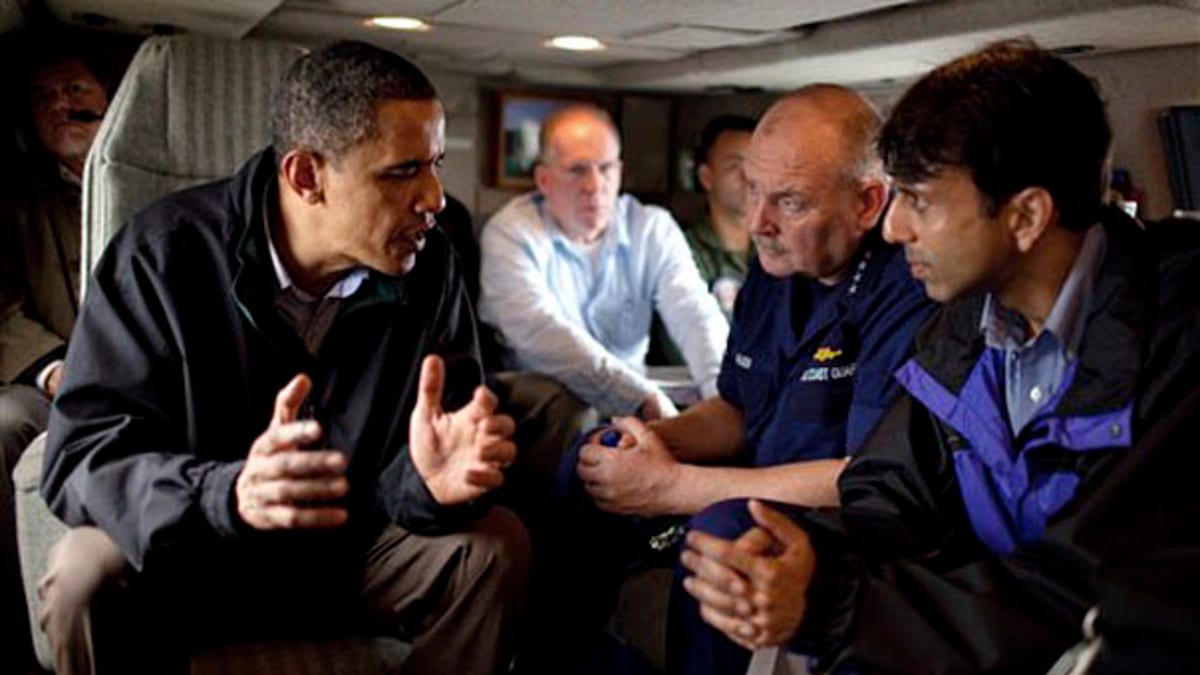
In this photo released by the White House, President Obama talks with U.S. Coast Guard Commandant Adm. Thad Allen, second right, and Louisiana Gov. Bobby Jindal aboard Marine One as they fly along the coastline from Venice, La., to New Orleans on May 2. (AP Photo)
President Obama warned Sunday that the vast oil spill nearing the Gulf coastline is a "potentially unprecedented" disaster, as he and other top administration officials defended the government's response and pledged a "relentless" federal effort to clean up the slick.
The president visited Louisiana to survey the damage and hear from local officials, who told him the oil is about nine miles from the state's coast. Obama warned that the spill could "seriously damage" the local economy and environment.
"We're dealing with a massive and potentially unprecedented environment disaster," Obama said. "It could extend for a long time. It could jeopardize the livelihoods of thousands of Americans who call this place home."
But in the face of emerging criticism, Obama and other top officials said the federal government has brought all possible resources to bear, rejecting comparisons to the Bush administration's handling of Hurricane Katrina in 2005. They said British Petroleum is ultimately responsible, but that the federal government will do its part to contain the damage and stop the leak. The president cautioned Sunday that the effort could take "many days," and said the federal government would spare no resource in attacking the problem, though BP will foot the bill in the end.
"From day one, we have prepared and planned for the worst," Obama said. "Your government will do whatever it takes, for as long as it takes, to stop this crisis."
The federal response to the spill has fluctuated since the April 20 oil rig explosion that triggered the rupture.
Earlier in the week, officials drastically increased their estimate of the size of the spill, from 1,000 to 5,000 barrels a day. The Department of Homeland Security then declared the spill an incident of "national significance" on Thursday, freeing up resources to tackle the spreading problem. And after the White House initially insisted that Obama would not travel to the region, the president flew into New Orleans Sunday -- traveling in his motorcade to Venice, La., two hours away, while meeting with Louisiana Gov. Bobby Jindal.
The White House also announced Sunday that it was canceling the president's scheduled visit Wednesday to New Jersey to discuss the economy.
White House Press Secretary Robert Gibbs said Sunday that Obama "just believed it was important to get down there as soon as he could and the quickest we could get down was today."
Speaking on "Fox News Sunday," top security and environmental officials said the federal government has been doing all it can to try to contain the mess.
"The administration responded all hands on deck from day one," Homeland Security Secretary Janet Napolitano said, explaining that the response "evolved" from a search-and-rescue mission for 11 oil rig workers who are now presumed dead to the cleanup effort under way.
She said any comparison to the federal response to Hurricane Katrina, in which hundreds of people were killed and the government had advance warning, is "a total mischaracterization."
She said BP is "ultimately responsible" for the disaster, an assessment echoed by Adm. Thad Allen, commandant of the U.S. Coast Guard.
Allen said the federal government should not completely take over the cleanup because, "by statute and by law, BP is the responsible party." He said the firm bears responsibility and costs in the aftermath of the spill.
He said, though, that the cleanup effort will continue to be a collaboration.
"It's a combination of BP and the federal government," he said. "We both have to execute our responsibilities."
The spill has already impacted the Gulf Coast economy. The National Oceanic and Atmospheric Administration on Sunday announced that it was closing commercial and recreational fishing along the coastline from Louisiana to the Florida panhandle.
Tim Kant, mayor of Fairhope, Ala., told Fox News that the federal government needs to step up its response, even if it means sending BP the bill later.
"This is too much for BP or any company to deal with," he said.
Interior Secretary Ken Salazar told "Fox News Sunday" that the federal government is doing all it can to help keep the spill from spreading.
"Every effort is being made to stop the source right now," he said. "There has not been a minute of rest since this started."
Salazar gave a dire warning about the potential size of the environmental and economic damage that the spill could cause. He said BP's plans to drill a relief well near the original source in order to relieve pressure -- something he called the "ultimate solution" -- could take up to three months.
"There are scenarios that it could be worse than the Exxon Valdez. We're not sugarcoating this thing," he said.




